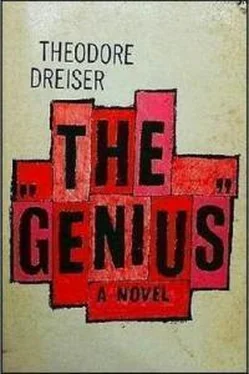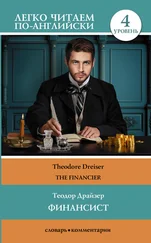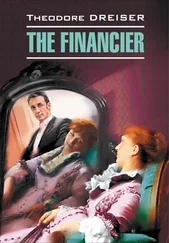Теодор Драйзер - The Genius
Здесь есть возможность читать онлайн «Теодор Драйзер - The Genius» весь текст электронной книги совершенно бесплатно (целиком полную версию без сокращений). В некоторых случаях можно слушать аудио, скачать через торрент в формате fb2 и присутствует краткое содержание. Год выпуска: 2014, Издательство: epubBooks Classics, Жанр: Классическая проза, на английском языке. Описание произведения, (предисловие) а так же отзывы посетителей доступны на портале библиотеки ЛибКат.
- Название:The Genius
- Автор:
- Издательство:epubBooks Classics
- Жанр:
- Год:2014
- ISBN:нет данных
- Рейтинг книги:4 / 5. Голосов: 1
-
Избранное:Добавить в избранное
- Отзывы:
-
Ваша оценка:
- 80
- 1
- 2
- 3
- 4
- 5
The Genius: краткое содержание, описание и аннотация
Предлагаем к чтению аннотацию, описание, краткое содержание или предисловие (зависит от того, что написал сам автор книги «The Genius»). Если вы не нашли необходимую информацию о книге — напишите в комментариях, мы постараемся отыскать её.
The Genius — читать онлайн бесплатно полную книгу (весь текст) целиком
Ниже представлен текст книги, разбитый по страницам. Система сохранения места последней прочитанной страницы, позволяет с удобством читать онлайн бесплатно книгу «The Genius», без необходимости каждый раз заново искать на чём Вы остановились. Поставьте закладку, и сможете в любой момент перейти на страницу, на которой закончили чтение.
Интервал:
Закладка:
"I want to say to you tonight that I am a well man—not well physically only, but well mentally, and, what is better yet, in so far as I can see the truth, spiritually. I was healed after six months' treatment by a Christian Science practitioner in Chicago, who took my case on my appealing to her, and I stand before you absolutely sound and whole. God is good."
He sat down.
While he had been talking Eugene had been studying him closely, observing every line of his features. He was tall, lean, sandy–haired and sandy–bearded. He was not bad–looking, with long straight nose, clear blue eyes, a light pinkish color to his complexion, and a sense of vigor and health about him. The thing that Eugene noted most was that he was calm, cool, serene, vital. He said exactly what he wanted to say, and he said it vigorously. His voice was clear and with good carrying power. His clothes were shapely, new, well made. He was no beggar or tramp, but a man of some profession—an engineer, very likely. Eugene wished that he might talk to him, and yet he felt ashamed. Somehow this man's case paralleled his own; not exactly, but closely. He personally was never diseased, but how often he had looked after a perfectly charming woman to lust after her! Was the thing that this man was saying really true? Could he be lying? How ridiculous! Could he be mistaken? This man? Impossible! He was too strong, too keen, too sincere, too earnest, to be either of these things. Still—But this testimony might have been given for his benefit, some strange helpful power—that kindly fate that had always pursued him might be trying to reach him here. Could it be? He felt a little strange about it, as he had when he saw the black–bearded man entering the train that took him to Three Rivers, the time he went at the call of Suzanne, as he did when horseshoes were laid before him by supernatural forces to warn him of coming prosperity. He went home thinking, and that night he seriously tried to read "Science and Health" for the first time.
Chapter XXV
Those who have ever tried to read that very peculiar and, to many, very significant document know what an apparent jumble of contradictions and metaphysical balderdash it appears to be. The statement concerning the rapid multiplication and increased violence of diseases since the flood, which appears in the introduction is enough to shock any believer in definite, material, established natural science, and when Eugene came upon this in the outset, it irritated him, of course, greatly. Why should anybody make such a silly statement as this? Everybody knew that there had never been a flood. Why quote a myth as a fact? It irritated and from a critical point of view amused him. Then he came upon what he deemed to be a jumble of confusion in regard to matter and spirit. The author talked of the evidences of the five physical senses as being worthless, and yet was constantly referring to and using similes based upon those evidences to illustrate her spiritual meanings. He threw the book down a number of times, for the Biblical references irritated him. He did not believe in the Bible. The very word Christianity was a sickening jest, as sickening as it had been to the man in the church. To say that the miracles of Christ could be repeated today could not be serious. Still the man had testified. Wasn't that so? A certain vein of sincerity running through it all—that profound evidence of faith and sympathy which are the characteristics of all sincere reformers—appealed to him. Some little thoughts here and there—a profound acceptance of the spiritual understanding of Jesus, which he himself accepted, stayed with him. One sentence or paragraph somehow stuck in his mind, because he himself was of a metaphysical turn―
"Become conscious for a single moment that life and intelligence are purely spiritual, neither in nor of matter, and the body will then utter no complaints. If suffering from a belief in sickness, you will find yourself suddenly well. Sorrow is turned into joy when the body is controlled by spiritual life and love."
"God is a spirit," he recalled Jesus as saying. "They that worship Him must worship in spirit and in truth."
"You will find yourself suddenly well," thought Eugene. "Sorrow is turned into joy."
"Sorrow. What kind of sorrow? Love sorrow? This probably meant the end of earthly love; that that too was mortal."
He read on, discovering that Scientists believed in the immaculate conception of the Virgin Mary, which struck him as silly; also that they believed in the ultimate abolition of marriage as representing a mortal illusion of self–creation and perpetuation, and of course the having of children through the agency of the sexes, also the dematerialization of the body—its chemicalization into its native spirituality, wherein there can be neither sin, sickness, disease, decay nor death, were a part of their belief or understanding. It seemed to him to be a wild claim, and yet at the time, because of his natural metaphysical turn, it accorded with his sense of the mystery of life.
It should be remembered as a factor in this reading that Eugene was particularly fitted by temperament—introspective, imaginative, psychical—and by a momentarily despairing attitude, in which any straw was worth grasping at which promised relief from sorrow, despair and defeat, to make a study of this apparently radical theory of human existence. He had heard a great deal of Christian Science, seeing its churches built, its adherents multiplying, particularly in New York, and enthusiastically claiming freedom from every human ill. Idle, without entertainment or diversion and intensely introspective, it was natural that these curious statements should arrest him.
He was not unaware, also, from past reading and scientific speculation, that Carlyle had once said that "matter itself—the outer world of matter, was either nothing, or else a product due to man's mind" (Carlyle's Journal, from Froude's Life of Carlyle), and that Kant had held the whole universe to be something in the eye or mind—neither more nor less than a thought. Marcus Aurelius, he recalled, had said somewhere in his meditations that the soul of the universe was kind and merciful; that it had no evil in it, and was not harmed by evil. This latter thought stuck in his mind as peculiar because it was so diametrically opposed to his own feelings that the universe, the spirit of it that is, was subtle, cruel, crafty, and malicious. He wondered how a man who could come to be Emperor of Rome could have thought otherwise. Christ's Sermon on the Mount had always appealed to him as the lovely speculations of an idealist who had no real knowledge of life. Yet he had always wondered why "Lay not up for yourselves treasures upon earth, where moth and rust doth corrupt, and where thieves break through and steal" had thrilled him as something so beautiful that it must be true "For where your treasure is there will your heart be also." Keats had said "beauty is truth—truth beauty," and still another "truth is what is."
"And what is?" he had asked himself in answer to that.
"Beauty," was his reply to himself, for life at bottom, in spite of all its teeming terrors, was beautiful.
Only those of a metaphysical or natural religious turn of mind would care to follow the slow process of attempted alteration, which took place during the series of months which followed Angela's departure for Racine, her return to New York at Myrtle's solicitation, the time she spent in the maternity hospital, whither she was escorted on her arrival by Eugene and after. These are the deeps of being which only the more able intellectually essay, but Eugene wandered in them far and wide. There were long talks with Myrtle and Bangs—arguments upon all phases of mortal thought, real and unreal, with which Angela's situation had nothing to do. Eugene frankly confessed that he did not love her—that he did not want to live with her. He insisted that he could scarcely live without Suzanne. There was the taking up and reading or re–reading of odd philosophic and religious volumes, for he had nothing else to do. He did not care at first to go and sit with Angela, sorry as he was for her. He read or re–read Kent's "History of the Hebrews"; Weiniger's "Sex and Character"; Carl Snyder's "The World Machine"; Muzzey's "Spiritual Heroes"; Johnston's translation of "Bhagavad Ghita"; Emerson's essay on the Oversoul, and Huxley's "Science and Hebrew Tradition" and "Science and Christian Tradition." He learned from these things some curious facts which relate to religion, which he had either not known before or forgotten, i.e., that the Jews were almost the only race or nation which developed a consecutive line of religious thinkers or prophets; that their ideal was first and last a single God or Divinity, tribal at first, but later on universal, whose scope and significance were widened until He embraced the whole universe—was, in fact, the Universe—a governing principle—one God, however, belief in whom, His power to heal, to build up and overthrow had never been relinquished.
Читать дальшеИнтервал:
Закладка:
Похожие книги на «The Genius»
Представляем Вашему вниманию похожие книги на «The Genius» списком для выбора. Мы отобрали схожую по названию и смыслу литературу в надежде предоставить читателям больше вариантов отыскать новые, интересные, ещё непрочитанные произведения.
Обсуждение, отзывы о книге «The Genius» и просто собственные мнения читателей. Оставьте ваши комментарии, напишите, что Вы думаете о произведении, его смысле или главных героях. Укажите что конкретно понравилось, а что нет, и почему Вы так считаете.









